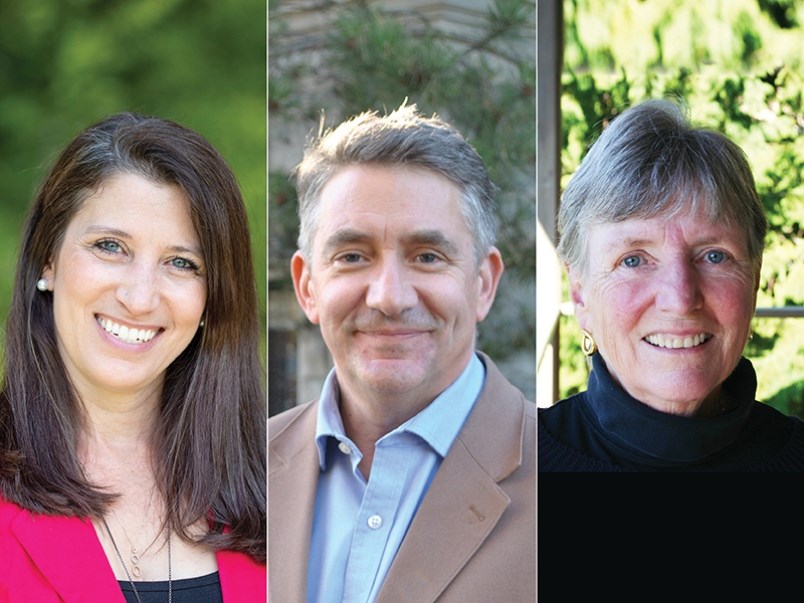Powell River-Sunshine Coast candidates running in the provincial election were asked what they thought were major issues facing Powell River. The following are the responses from the three candidates, representing the Green Party of BC, New Democratic Party and BC Liberal Party.
Regarding BC Ferries, Green candidate Kim Darwin said: “We live in ferry-dependent communities and the BC Greens know that the ferries are part of our highway system. They are not separate – they are part of our marine highways and we will treat them that way.”
Darwin said the BC Greens advocate the ferry system being returned as a crown corporation. She said it would also require a regulatory commission to provide oversight to eliminate price gouging and to hold the corporation accountable for its service.
“I would push for service levels that could be relied on here on the coast,” said Darwin. “That means hourly sailings on the lower Sunshine Coast with a two-ferry system, which will benefit Powell River residents when they have to head into the city.”
She also advocates for the Powell River to Comox ferry to be in-ported in Powell River at night.
“That’s for safety as well as service,” said Darwin.
She also believes in synchronizing the Saltery Bay ferry with the Langdale ferry so it is a connecting route.
“Again, it is an extension of our marine highway,” said Darwin. “They are supposed to be in service for us.”
In terms of transportation, New Democratic Party candidate Nicholas Simons said top of mind for people who live in ferry-reliant communities is service.
“Wherever we can, we try to make sure the service levels are adequate and that our communities are properly serviced by our marine transportation routes,” said Simons. “When we put in the 15 per cent discount [for BC Ferries], I looked to see what year that brought us down to, and that was 2011, the last time we paid this amount for ferries. Fares were really going up so steeply. Making sure we do what we can to keep ferries affordable is important.”
In terms of BC Ferries, BC Liberal candidate Sandra Stoddart-Hansen said the region is ferry dependent.
“The ferries have been impacted by COVID-19, but even before COVID, have not been adequately servicing the people in our riding,” said Stoddart-Hansen. “The ferry delays, the Horseshoe Bay-Langdale run, capacity, overload situations and long waits are all issues I feel strongly that need to be addressed really rapidly after this election is over.”
Stoddart-Hansen believes the Saltery Bay ferry is a connecting ferry to Langdale and that priority should be given to people departing Powell River on the ferry to Vancouver.
Forestry-related issues were also outlined by the candidates. Darwin said: “One of the largest things I’ve heard from all walks of life and all demographics is forestry. We know that forestry essentially built our province and it has been so dismally mismanaged. To have a government that would change our forest practices to a more sustainable forest sector would benefit all of our communities.”
Darwin said Powell River has had a guillotine hanging over its head with the downsizing of the Catalyst Paper Corporation mill for so many years. It has sort of been a death by a thousand cuts, closing down sector by sector, she added.
“We absolutely need to reform who has the rights to harvest wood and start moving toward smaller companies, to small tenures held by first nations and community forests,” said Darwin. “Changing the way we actually pull wood out of the forests is also going to be really important. No more clearcutting and only cutting second-growth forests.”
Darwin said the BC Greens would immediately halt the logging of old-growth forests and high-risk ecosystems all across the province.
She said it is also important that the community benefits from value-added components.
“That means making sure that a single log does not leave British Columbia without at least one cut in it,” said Darwin. “That equals jobs.” She said she is not in favour of raw log exports.
Simons said the premier has raised the issue of Catalyst and its viability, and the strength of the pulp and paper sectors. He said he expects the government to continue to support workers.
“There are lots of transitions going on and we’re all aware of the importance of the largest private sector employer in Powell River,” said Simons. “The government’s insistence on protecting the pensions of workers and finding ways for the mill to be successful are priorities of the premier and me. The uncertainty of the current curtailment is concerning to people of this community and that’s definitely around the issue of making sure the economies of our communities are supported.”
Stoddart-Hansen said she has done some research into Catalyst, having met with the president of Local 76.
“It really enhanced my knowledge of the issues faced by the mill and the workers at the mill,” she said. “I found that extremely useful.”
Stoddart-Hansen said she also had a good conversation with Powell River mayor Dave Formosa and he gave her some very good perspective on what has happened with the mill over time and what the issues are.
“That was extremely helpful, too, so I feel much better informed about the issue,” said Stoddart-Hansen. “I think I would be able to much better support the mill in meeting the challenges that they have been facing. It’s an issue I would pursue with real vigour.”
One day after answering the questions above during interviews with the Peak, the three candidates took part in an all-candidates meeting in Powell River on October 14. Below is a video of that meeting in its entirety.



